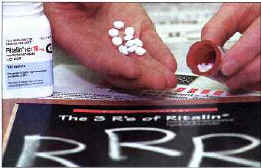|
Home Page
Overview
Testimonials & Reviews
Radio & Videos
Articles
Testing & Eval
Training
Parents
Teachers
Doctors
Locations
History
Contents
Contact Us
Autism
ADD/ADHD, Dyslexia
Frequently Asked Questions (FAQs)
Overview
Testing
Long Distance Clients
|
ADD /
ADHD, Dyslexia. It's a family issue. Improve
grades and self-esteem. Evaluation and non-drug therapy that
really works!
|
| |
Medications Prescribed for ADD/ADHD behaviors
Following are a list of medications that are more commonly
prescribed for Attention Deficit Disorder:
-
Adderall (dextro-amphetamine
sulfate with other amphetamine mixture)
-
Adderall xr ® (extended
release adderall)
-
Concerta (methylphenidate in time release
capsules)
-
Cylert (pemoline - not
commonly used anymore due to liver damage)
-
Dexedrine (dextro-amphetamine
sulfate)
-
Ritalin (methyphenidate)
-
Strattera (atomoxetine) -
newly approved by the FDA
-
Wellbutrin (bupropion HCl)
|
A list of less often prescribed meds; sometimes used
together with psychotropics include:
-
Celexa
-
Clonidine
-
Concerta
-
Depacote
-
Paxil
-
Prozac
-
Resperidol
-
Tegretol
-
Tenex
-
Zoloft
|
 Trade names
are trademarks registered or otherwise of their respective manufacturers. Trade names
are trademarks registered or otherwise of their respective manufacturers.
For a table of
the side effects
of a number of these click here.
As an ALTERNATIVE treatment or therapy to using
medications, consider the Sharper Minds program. This mental performance
enhancement program deals with a number of the root causes of attention deficit
disorder, many behavioral issues and learning problems.
Of the children and adults who were taking
medications for ADD/ADHD when they started the Sharper Minds neural-cognitive therapy,
- around
80% were able to discontinue those meds within 8 to 12 weeks.
- Another 10% took around 6 months (usually
related to a situation in which the mother smoked, drank or did drugs during
pregnancy), and
- in the last 5-10% of cases where a child took
longer to reduce their dependency, the issue was more parent-related than
child-related.
Changes made are lasting, not a patch or a
temporary "band-aid." Start at our home
page for more information.
When considering a treatment plan for children
that may have learning
disabilities, dyslexia, ADD/ADHD, make sure you incorporate not just the
medications, but also therapies with the intent of diminishing dependence on the
meds as well.
|
